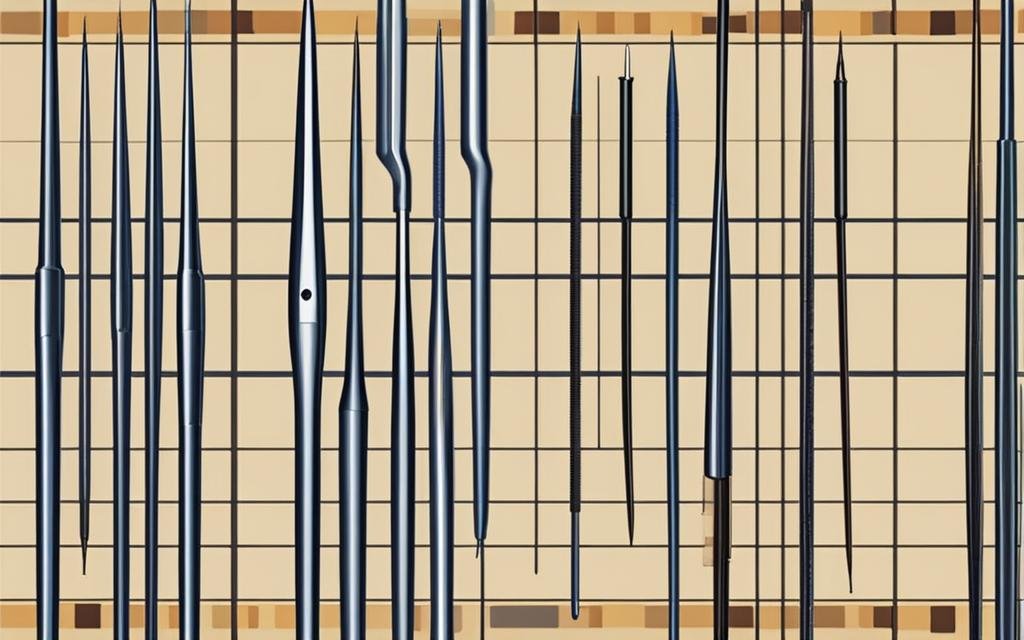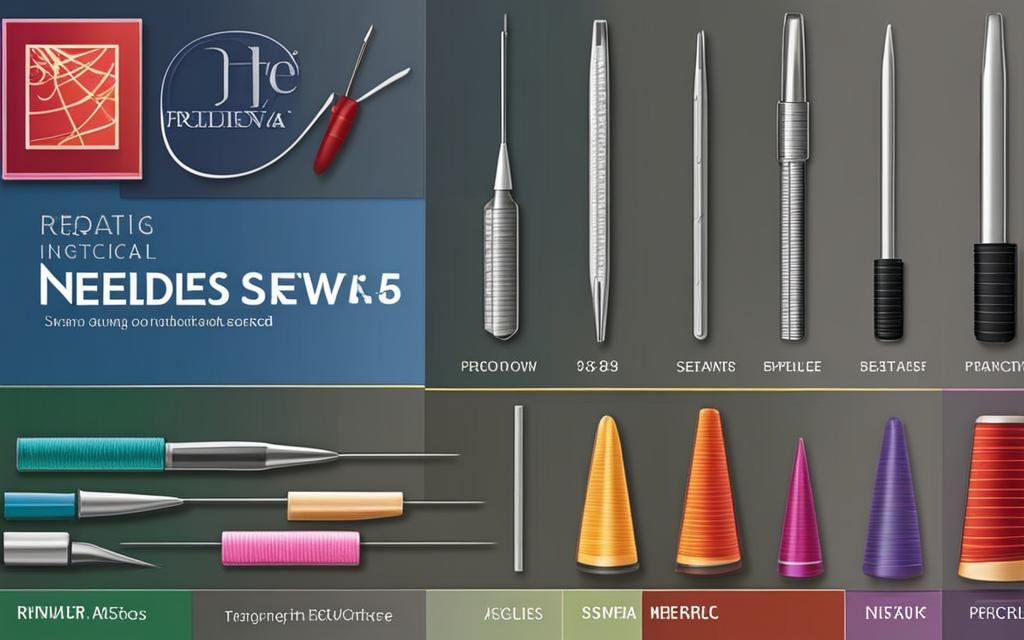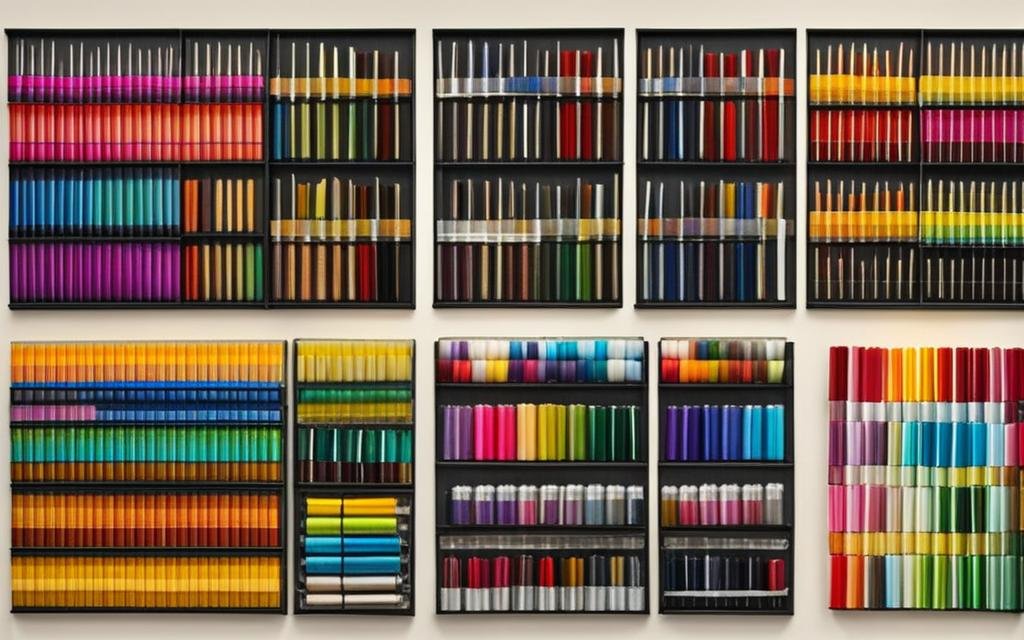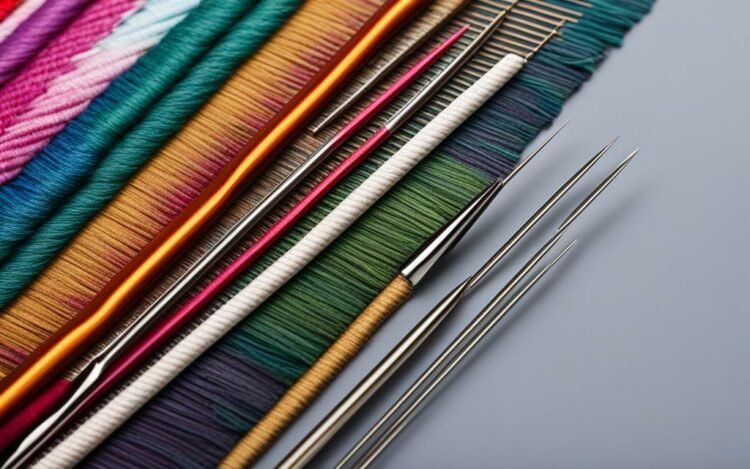Sewing needles are an essential tool for any sewing project. Choosing the right needle is crucial for achieving the best results. There are various factors to consider when purchasing sewing needles, including the needle type, size, and brand. In this ultimate guide, we will explore the different types of sewing needles, provide tips for selecting the right needle for your project, and highlight some of the top brands in the market.
Key Takeaways:
- Choosing the right sewing needle is essential for achieving professional-looking results.
- Consider the fabric type and project requirements when selecting sewing needles.
- Top sewing needle brands like John James, Schmetz, Singer, Groz-Beckert, and Dritz offer quality options.
- Proper needle care and maintenance, including regular replacement, can prolong the life of sewing needles.
- By following the advice in this ultimate guide, you’ll be able to make informed sewing needle purchase decisions.
Understanding Sewing Needle Types and Sizes
Sewing needles are not one-size-fits-all. They come in various types and sizes, each with its own purpose and function. To choose the right needle for your sewing project, it’s important to understand the different needle types and sizes available.
Types of Sewing Needles
There are several common types of sewing needles that you may come across:
- Sharps: These are general-purpose needles with a sharp point, suitable for most woven fabrics.
- Repair Needles: Designed for mending and repairing garments, these needles have a longer eye and sharp point.
- Tapestry/Cross Stitch Needles: These needles have a blunt point and large eye, perfect for cross-stitching and embroidery.
- Embroidery/Crewel Needles: Similar to tapestry needles, these have a sharp point and large eye, ideal for embroidery work.
- Machine Needles: Specifically designed for sewing machines, these needles come in different types for various fabrics and techniques.
Sewing Needle Sizes
The size of a sewing needle is denoted by a number, which indicates the needle’s diameter. Smaller numbers indicate finer needles, while larger numbers indicate heavier needles. The appropriate needle size depends on the fabric weight and thickness:
- Use smaller needle sizes (e.g., 9, 11) for lightweight fabrics like chiffon and silk.
- Medium needle sizes (e.g., 12, 14) are suitable for medium-weight fabrics such as cotton and linen.
- Choose larger needle sizes (e.g., 16, 18) for heavyweight fabrics like denim and upholstery materials.
Remember, using the right needle type and size for your fabric and project will ensure smooth, precise stitching and minimize the risk of damage or thread breakage. Take the time to select the appropriate needle to achieve the best results in your sewing endeavors.

Pro Tip: Want to save on sewing essentials? Check out Sewing Machines Plus discount codes for great deals on sewing machine feet, needles, and more. Sew smarter and save with these exclusive offers!
Essential Factors for Needle Selection
When it comes to selecting the right sewing needles, there are a few essential factors to consider. By taking these factors into account, you can ensure that you choose the perfect needle for your project, resulting in optimal stitching and professional-looking results.
Fabric Type
The first factor to consider is the type of fabric you will be working with. Different fabrics require different needle types to prevent damage and achieve smooth stitching. For woven fabrics such as cotton or linen, sharp needles are recommended. On the other hand, knit fabrics like jersey or spandex require ballpoint needles to avoid snags and skipped stitches.
Needle Size
The weight and thickness of your fabric also play a role in needle selection. The size of a sewing needle is denoted by a number, with smaller numbers indicating finer needles and larger numbers indicating heavier needles. For lightweight fabrics, such as silk or chiffon, a smaller needle size like 9 or 11 is suitable. For heavier fabrics like denim or upholstery, opt for a larger size such as 16 or 18.
Project Requirements
Lastly, consider the specific requirements of your project. If you’re working on quilting, a quilting needle with a sharp point and a slightly curved needle shape is ideal. For embroidery or decorative stitching, embroidery needles with larger eyes to accommodate thicker threads are recommended. By choosing a needle that aligns with your project needs, you can achieve the best results.
By considering these essential factors – fabric type, needle size, and project requirements – you can make informed decisions when purchasing sewing needles. Remember, each project may have different requirements, so it’s always a good idea to have a variety of needle types and sizes in your sewing kit. With the right needle, you’ll be on your way to creating beautiful and professional-looking garments, accessories, and home decor items.

Top Sewing Needle Brands
When it comes to sewing needles, investing in quality brands can make a significant difference in your sewing experience. Here are some of the top sewing needle brands that are trusted by sewers worldwide:
- John James: Known for their precision and durability, John James needles are a popular choice among sewers. Their extensive range of needles caters to various sewing techniques and fabric types.
- Schmetz: With over 170 years of experience, Schmetz is a leading brand in the sewing industry. Their needles are known for their sharpness, smooth sewing, and compatibility with both home sewing machines and industrial machines.
- Singer: As a well-established name in the sewing world, Singer offers a wide selection of needles for different sewing projects. Their needles are known for their reliability, consistency, and compatibility with Singer sewing machines.
- Groz-Beckert: Known for their high-quality needles, Groz-Beckert is a preferred choice for many professional sewers. Their needles are designed to withstand heavy use and provide excellent stitch quality.
- Dritz: Dritz offers a range of sewing needles that cater to various skill levels and projects. Their needles are known for their durability and versatility, making them suitable for both hand-sewing and machine-sewing tasks.

Whether you are a beginner or an experienced sewer, choosing needles from reputable brands can ensure better stitching results and overall satisfaction with your sewing projects. These top sewing needle brands have earned a reputation for their high-quality products and are recommended by professionals in the industry. By selecting needles from these trusted brands, you can have confidence in the performance and longevity of your sewing needles.
Tips for Needle Care and Maintenance
Proper care and maintenance of sewing needles are essential for their longevity and performance. By following these tips, you can prolong the life of your sewing needles and achieve better sewing results.
1. Regularly change your sewing machine needle
It is recommended to change your sewing machine needle regularly, especially after 6-8 hours of sewing or if it becomes dull or bent. A dull needle can cause skipped stitches, uneven tension, and fabric damage. By using a fresh needle, you ensure smooth stitching and prevent potential issues.
2. Use the appropriate needle for each project
Using the right needle for your project is crucial for achieving optimal results. Different fabrics require different needle types and sizes. For example, use a ballpoint needle for knit fabrics to prevent snagging or a sharp needle for woven fabrics to ensure precise stitches. Refer to the needle packaging or consult a sewing guide to determine the best needle for your specific fabric.
3. Avoid hitting pins while sewing
Accidentally hitting pins while sewing can damage the needle, affecting its performance and potentially leading to needle breakage. Take extra caution to avoid hitting pins and remove them before they come into contact with the needle. This simple step can prevent unnecessary needle damage and save you from interruptions during your sewing projects.

By implementing these needle care and maintenance practices, you can ensure that your sewing needles stay in optimal condition, prolonging their lifespan and enhancing your sewing experience. Remember to regularly change your needle, use the appropriate needle for each project, and be mindful of avoiding pin collisions. With proper care, your sewing needles will continue to deliver excellent results stitch after stitch.
Conclusion
When it comes to sewing projects, selecting the right sewing needles is essential for achieving professional-quality results. With the ultimate guide provided, you now have the knowledge and tips to make informed decisions when purchasing sewing needles.
By understanding the different types and sizes of sewing needles, you can choose the most suitable needle for your specific needs. Consider the recommendations of top sewing needle brands like John James, Schmetz, Singer, Groz-Beckert, and Dritz to ensure you’re getting needles of the highest quality.
Remember, proper care and maintenance of your sewing needles are crucial for their longevity and optimum performance. Regularly change your sewing machine needle, use the appropriate needle for each project, and avoid hitting pins while sewing to prevent damage and achieve smooth stitching.
With this ultimate guide, you are now equipped with the knowledge and resources to make the best sewing needle purchase decisions. So go ahead, explore the different options available, and embark on your sewing journey with confidence!

